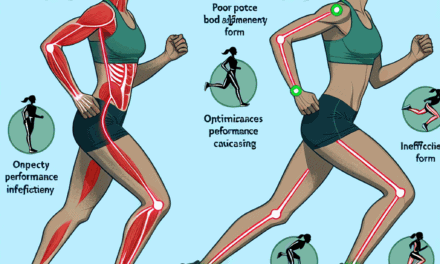Empowering Your Health Journey: Modern Strategies for Success
In today’s fast-paced world, the pursuit of health and wellness can often feel overwhelming. With an abundance of information available at our fingertips, it can be challenging to discern what strategies are truly effective for achieving and maintaining good health. This article aims to empower you on your health journey by exploring modern strategies that can lead to success. We will delve into five key subtopics: the importance of personalized nutrition, the role of mental health, the impact of technology on health management, the significance of physical activity, and the benefits of community support. Each section will provide valuable insights, practical tips, and evidence-based strategies to help you take charge of your health.
1. The Importance of Personalized Nutrition
Nutrition is a cornerstone of health, yet the one-size-fits-all approach often fails to meet individual needs. Personalized nutrition tailors dietary recommendations based on an individual’s unique genetic makeup, lifestyle, and health goals. This approach recognizes that what works for one person may not work for another, making it a powerful strategy for achieving optimal health.
Understanding Nutrigenomics
Nutrigenomics is the study of how genes and diet interact. Research in this field has shown that genetic variations can influence how individuals metabolize nutrients, respond to dietary changes, and are at risk for certain diseases. For example, some people may have a genetic predisposition to lactose intolerance, making dairy consumption problematic for them. Others may have variations that affect their ability to process carbohydrates, which can impact weight management and energy levels.
By understanding these genetic factors, individuals can make informed dietary choices that align with their unique needs. Genetic testing services, such as 23andMe or Nutrigenomix, can provide insights into how your body responds to different foods, helping you create a personalized nutrition plan.
Creating a Personalized Nutrition Plan
To develop a personalized nutrition plan, consider the following steps:
- Assess Your Current Diet: Keep a food diary for a week to identify patterns and areas for improvement.
- Identify Your Goals: Determine whether you want to lose weight, gain muscle, improve energy levels, or manage a health condition.
- Consult a Professional: Work with a registered dietitian or nutritionist who can help you interpret genetic testing results and create a tailored plan.
- Incorporate Variety: Focus on a diverse range of whole foods, including fruits, vegetables, whole grains, lean proteins, and healthy fats.
- Monitor and Adjust: Regularly evaluate your progress and make adjustments as needed to stay aligned with your goals.
Case Study: The Power of Personalized Nutrition
A study published in the journal Cell demonstrated the effectiveness of personalized nutrition. Researchers provided participants with either a standard diet or a personalized diet based on their microbiome composition. The results showed that those on the personalized diet experienced greater weight loss and improved metabolic health markers compared to those on the standard diet. This highlights the potential of personalized nutrition to enhance health outcomes.
Conclusion
Personalized nutrition is a powerful tool for empowering your health journey. By understanding your unique genetic makeup and dietary needs, you can make informed choices that support your overall well-being. As research in this field continues to evolve, the potential for tailored dietary strategies will only grow, making it an essential component of modern health management.
2. The Role of Mental Health in Overall Wellness
Mental health is an integral part of overall wellness, yet it is often overlooked in discussions about health. The connection between mental and physical health is well-documented, with research showing that mental health issues can lead to physical health problems and vice versa. Therefore, addressing mental health is crucial for empowering your health journey.
The Mind-Body Connection
The mind-body connection refers to the relationship between mental and physical health. Stress, anxiety, and depression can manifest as physical symptoms, such as headaches, fatigue, and digestive issues. Conversely, chronic physical conditions can lead to mental health challenges, creating a cycle that can be difficult to break.
For example, a study published in the journal Psychosomatic Medicine found that individuals with chronic pain were more likely to experience depression and anxiety. This highlights the importance of addressing both mental and physical health in a holistic manner.
Strategies for Improving Mental Health
To empower your mental health, consider implementing the following strategies:
- Practice Mindfulness: Mindfulness meditation can help reduce stress and improve emotional regulation. Apps like Headspace and Calm offer guided sessions for beginners.
- Engage in Regular Physical Activity: Exercise has been shown to boost mood and reduce symptoms of anxiety and depression. Aim for at least 150 minutes of moderate-intensity exercise per week.
- Prioritize Sleep: Quality sleep is essential for mental health. Establish a regular sleep schedule and create a relaxing bedtime routine to improve sleep quality.
- Seek Professional Help: If you’re struggling with mental health issues, consider reaching out to a therapist or counselor for support.
- Build a Support Network: Surround yourself with supportive friends and family who can provide encouragement and understanding.
Case Study: The Impact of Mental Health on Physical Health
A longitudinal study conducted by the National Institute of Mental Health found that individuals with untreated depression were more likely to develop chronic health conditions, such as heart disease and diabetes. This underscores the importance of addressing mental health as part of a comprehensive health strategy.
Conclusion
Empowering your mental health is essential for overall wellness. By recognizing the mind-body connection and implementing strategies to improve mental well-being, you can enhance your physical health and achieve a more balanced life. Prioritizing mental health is not just beneficial; it is a necessary component of a successful health journey.
3. The Impact of Technology on Health Management
Technology has revolutionized the way we approach health management. From wearable devices to mobile health apps, technology offers innovative solutions for tracking and improving health. This section explores the various ways technology can empower your health journey.
Wearable Devices and Health Tracking
Wearable devices, such as fitness trackers and smartwatches, have gained popularity in recent years. These devices allow users to monitor various health metrics, including heart rate, steps taken, sleep patterns, and more. By providing real-time feedback, wearables can motivate individuals to stay active and make healthier choices.
A study published in the journal JAMA Internal Medicine found that individuals who used fitness trackers were more likely to increase their physical activity levels compared to those who did not use such devices. This demonstrates the potential of technology to promote healthier behaviors.
Mobile Health Apps
Mobile health apps offer a convenient way to manage various aspects of health, from nutrition tracking to mental health support. Some popular categories of health apps include:
- Nutrition Tracking: Apps like MyFitnessPal and Lose It! allow users to log their food intake and monitor their nutritional goals.
- Fitness Apps: Apps such as Strava and Nike Training Club provide workout plans and track exercise progress.
- Mental Health Apps: Apps like Moodfit and Woebot offer tools for managing stress, anxiety, and depression.
- Telehealth Services: Platforms like Teladoc and Amwell enable users to consult with healthcare professionals remotely.
Data Privacy and Security Concerns
While technology offers numerous benefits for health management, it also raises concerns about data privacy and security. Users must be cautious about sharing personal health information and ensure that the apps and devices they use comply with privacy regulations, such as HIPAA in the United States.
To protect your data, consider the following tips:
- Read Privacy Policies: Before using an app or device, review its privacy policy to understand how your data will be used and shared.
- Use Strong Passwords: Protect your accounts with strong, unique passwords and enable two-factor authentication when available.
- Limit Data Sharing: Only share the minimum amount of personal information necessary for the app or device to function.
Conclusion
Technology has the potential to significantly enhance your health journey by providing tools for tracking, managing, and improving health. By leveraging wearable devices and mobile health apps, you can gain valuable insights into your health and make informed decisions. However, it is essential to remain vigilant about data privacy and security to protect your personal information.
4. The Significance of Physical Activity
Physical activity is a fundamental component of a healthy lifestyle. Regular exercise not only improves physical fitness but also has profound effects on mental health and overall well-being. This section explores the significance of physical activity and provides strategies for incorporating it into your daily routine.
The Health Benefits of Regular Exercise
Engaging in regular physical activity offers numerous health benefits, including:
- Weight Management: Exercise helps burn calories and maintain a healthy weight.
- Improved Cardiovascular Health: Regular aerobic exercise strengthens the heart and improves circulation.
- Enhanced Mental Health: Physical activity releases endorphins, which can improve mood and reduce symptoms of anxiety and depression.
- Stronger Muscles and Bones: Resistance training helps build muscle mass and improve bone density.
- Better Sleep Quality: Regular exercise can promote better sleep patterns and improve overall sleep quality.
Finding the Right Type of Exercise
To empower your health journey, it is essential to find physical activities that you enjoy. This will increase the likelihood of sticking with your exercise routine. Consider the following types of exercise:
- Aerobic Exercise: Activities such as running, cycling, swimming, and dancing improve cardiovascular fitness.
- Strength Training: Weightlifting, resistance bands, and bodyweight exercises build muscle strength and endurance.
- Flexibility and Balance: Yoga and Pilates enhance flexibility, balance, and core strength.
- Recreational Sports: Joining a sports league or playing recreational games can make exercise fun and social.
Creating a Sustainable Exercise Routine
To create a sustainable exercise routine, consider the following tips:
- Set Realistic Goals: Start with achievable goals and gradually increase the intensity and duration of your workouts.
- Schedule Workouts: Treat exercise like an important appointment by scheduling it into your calendar.
- Mix It Up: Incorporate a variety of activities to prevent boredom and work different muscle groups.
- Find a Workout Buddy: Exercising with a friend can provide motivation and accountability.
- Listen to Your Body: Pay attention to how your body feels and adjust your routine as needed to prevent injury.
Conclusion
Physical activity is a vital component of a healthy lifestyle. By understanding the benefits of regular exercise and finding activities you enjoy, you can empower your health journey and improve your overall well-being. Remember that consistency is key, and making exercise a regular part of your routine will yield long-term benefits.
5. The Benefits of Community Support
Community support plays a crucial role in empowering individuals on their health journeys. Whether through family, friends, or organized groups, having a support system can provide motivation, accountability, and encouragement. This section explores the benefits of community support and how to cultivate it in your life.
The Power of Social Connections
Research has shown that social connections are linked to better health outcomes. A study published in the journal PLOS Medicine found that individuals with strong social ties had a 50% increased likelihood of survival compared to those with weaker connections. This highlights the importance of fostering relationships that support your health goals.
Building a Supportive Community
To cultivate a supportive community, consider the following strategies:
- Join Local Groups: Look for local fitness classes, support groups, or clubs that align with your interests and health goals.
- Engage Online: Participate in online forums or social media groups focused on health and wellness topics.
- Share Your Goals: Communicate your health goals with friends and





